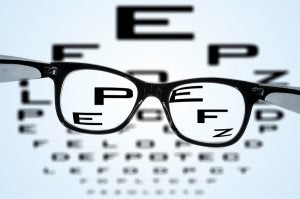-
Type of Work Involved in Ophthalmology
An ophthalmologist works across a few different platforms to try to prevent, diagnose, and treat eye disorders to help their patients maintain the best vision. Some eye doctors are more involved in the research aspect of the field to try to find new technology that can aid in the fight against vision loss.
The current technology in the ophthalmology field allows doctors to get a closer look at the eye and any conditions that might exist. Using technology like lasers allows an eye doctor to destroy abnormal vessels and tissues that might decrease a patient’s ability to see.
Check out this video to learn more about what ophthalmologists do and schedule an appointment with an eye doctor in Chicago. Regular eye exams help you prevent vision loss.
-
How Often Do You Need New Prescription Glasses?
 If you want to get the best vision, it is important to get new glasses when your prescription changes. Use this guide to determine when you should schedule an eye exam with your ophthalmologist to see if your prescription has changed.
If you want to get the best vision, it is important to get new glasses when your prescription changes. Use this guide to determine when you should schedule an eye exam with your ophthalmologist to see if your prescription has changed.Most eye doctors suggest getting an exam at least once every two years. If your prescription has changed frequently or if you are having difficulty seeing, you might want to go in for an exam every year. This way, the ophthalmologist can give you a thorough exam to see if there are any health concerns and to make sure your current prescription is serving you well.
Whether you want new glasses or a LASIK consultation in Chicago, you have to find an eye doctor you can trust. Schedule an appointment with an ophthalmologist to get an eye exam and to see if you feel comfortable with the doctor so you keep your regular appointments.
-
Understanding the Cataract Treatment Options
 Thanks to new advancements in ocular technology, a cataract diagnosis does not have to be bad news. If your eye doctor has told you that you have cataracts, keep reading to learn more about the condition and your treatment options.
Thanks to new advancements in ocular technology, a cataract diagnosis does not have to be bad news. If your eye doctor has told you that you have cataracts, keep reading to learn more about the condition and your treatment options.The Trouble with Cataracts
Before you can understand the various treatment options, it is important to learn what a cataract actually is. Some people think a cataract is a growth on the eye, but that is not true. It is actually a lens that has become cloudy, which disrupts one’s vision. Typically, cataracts develop with age, but they can also occur in younger patients or as a result of another issue like diabetes. If cataracts are negatively affecting the way you see, it might be time to look into eye surgery options.
Traditional Cataract Surgery
In this form of cataract surgery, the eye doctor removes the cloudy lens and replaces it with a monofocal IOL (intraocular lens). After the traditional surgery, most patients regain their ability to see distances. Some people still need glasses or other surgery procedures to restore their ability to see objects that are close or to get rid of astigmatism. Since this is a common treatment for cataracts, most insurance plans cover this kind of intraocular lens.
Custom Cataract Surgery
Scientists have made many improvements to intraocular lenses in the last few decades, which means that patients now have the option of getting custom cataract surgery with a multifocal IOL or an astigmatic correcting IOL. A multifocal IOL prevents presbyopia, or trouble seeing up close after the surgery. Astigmatic correcting IOLs corrects both the cloudy lens and astigmatism to leave a patient with the best vision possible.
If you have cataracts, you should visit an ophthalmologist serving Chicago for a thorough eye exam that can help you choose the right surgery option for your needs. The eye doctor will ask you about your vision troubles and your expectations from the cataract surgery to direct you toward the best treatment option possible.
-
We Want to Hear From You!
If you’ve had a positive experience with our Eye Clinic then we’d love to hear about it on our Google my business page . -
Why LASIK Is the Leading Laser Vision Correction Procedure
 Do you rely on contact lenses or glasses in order to see clearly throughout your day? Do you wish you could wake up in the morning and see without having to reach for your glasses first? If so, it might be time to consider scheduling a LASIK consultation near Chicago . LASIK eye surgery uses lasers to reshape the cornea, which in turn results in better vision and decreased reliance on glasses and contact lenses. Thousands of LASIK procedures are performed every day around the world, and for good reason. Read on to learn why LASIK is the leading laser vision correction procedure.
Do you rely on contact lenses or glasses in order to see clearly throughout your day? Do you wish you could wake up in the morning and see without having to reach for your glasses first? If so, it might be time to consider scheduling a LASIK consultation near Chicago . LASIK eye surgery uses lasers to reshape the cornea, which in turn results in better vision and decreased reliance on glasses and contact lenses. Thousands of LASIK procedures are performed every day around the world, and for good reason. Read on to learn why LASIK is the leading laser vision correction procedure.Effectiveness
One of the reasons why LASIK is so popular is quite simple: it works. About 96% of LASIK patients end up with their desired vision after the procedure, which can be life-changing for many people. Those who have always needed glasses or contacts to read, drive a car, or even look in the mirror may be able say goodbye to these assistive aids thanks to LASIK. If you still have room for improvement after LASIK eye surgery, you can ask your eye doctor about an enhancement procedure to make your results even more dramatic.
Safety
As with any surgery, it is important to understand the potential risks of LASIK before you undergo the procedure. However, new LASIK technology means that doctors rely on precise lasers to reshape your cornea, and no blades are involved at all. These lasers are safer and more accurate, and create more predictable results than ever before.
Recovery
Most patients who are considering LASIK have similar concerns, especially regarding whether the procedure will be painful and what the recovery period will be like. You should not be able to feel anything during the procedure, which can usually be completed in less than 30 minutes. After your eye surgery is complete, you may feel a slight bit of discomfort, but only for a few days at most. Your eye doctor can give you drops to make you more comfortable. There is no need for stitches or bandages following the procedure, though you will need someone else to drive you home on the day of your surgery.
